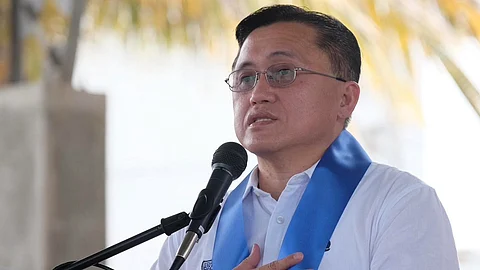
- NEWS
- the EDIT
- COMMENTARY
- BUSINESS
- LIFE
- SHOW
- ACTION
- GLOBAL GOALS
- SNAPS
- DYARYO TIRADA
- MORE

Senator Christopher “Bong” Go has just refiled Senate Bill No. 412 as the 20th Congress kicks off, continuing his push from the previous term to create a Magna Carta for Barangay Health Workers (BHWs).
As the chair of the Senate Committee on Health, Go stressed how important it is to set up a formal framework that recognizes the vital role BHWs play as frontliners in delivering basic healthcare. He wants to make sure these heroes get fair pay, benefits and job security.
He said, “Our barangay health workers played a huge role during the pandemic and continue to help with everyday health issues. We wouldn’t have come this far in responding to Covid without their sacrifices. They’re the ones supporting the barangays… taking care of early detection of diseases so things don’t get worse.”
In his explanation for the bill, Go pointed out that the 1987 Constitution already highlights the government’s responsibility to provide accessible health and social services to all Filipinos at affordable costs.
He also mentioned that under the Local Government Code, health services are devolved to local units right down to the barangay level, which is why BHWs are on the frontlines of basic healthcare delivery. “They’re key to achieving primary health care by offering accessible and acceptable services at the barangay level,” he said.
Despite their critical role, Go lamented that BHWs are still considered volunteers, often only receiving small incentives and lacking job security.
“To fix this gap and properly recognize their role in community healthcare, this bill proposes giving BHWs the same pay and benefits, including job security, as public health workers,” he added.
If passed, Senate Bill 412 would formally recognize BHWs as essential members of the community health workforce. The bill clearly defines their roles as primary healthcare providers, health educators, community organizers and record keepers.
Go also explained that the bill empowers BHWs to be the first point of contact for healthcare in their communities under the Universal Health Care Act (RA 11223).
The Department of Health (DoH), working with local governments, will also be tasked with regularly determining the ideal number of BHWs per barangay based on population and health needs.
To help professionalize and build their skills, the Magna Carta sets clear standards for registration and certification, requiring orientation, training, and at least two years of continuous satisfactory service before a BHW can be certified.
Go highlighted that once enacted, “the DoH, in consultation with TESDA, CHEd, and the Civil Service Commission, will set the policies and guidelines for certifying the competency of BHWs.”
The bill also proposes creating a National BHW Information System to serve as a central database for all BHWs nationwide, which will help in planning, deployment and policy-making.
To honor their service, the bill offers a range of benefits: a monthly honorarium of at least P3,000 for registered BHWs and P5,000 for certified ones, transportation and subsistence allowances, hazard pay, insurance, special health emergency allowances during crises, a December cash gift equal to at least one month’s pay, and a one-time service recognition incentive for those who have served at least 15 years.
Certified BHWs who have worked continuously for five years will also gain sub-professional eligibility and get credited service years toward government retirement benefits if they become regular government employees.
The bill protects BHWs’ welfare with free legal services, education and career opportunities, priority access to livelihood programs, and safeguards against discrimination and coercion. It also prohibits BHWs from engaging in partisan politics to keep their role impartial.
The measure also institutionalizes BHW associations at all levels — from municipal up to national — giving them a collective voice in policymaking and advocacy. A national federation with its own governance will represent them at the highest levels.
